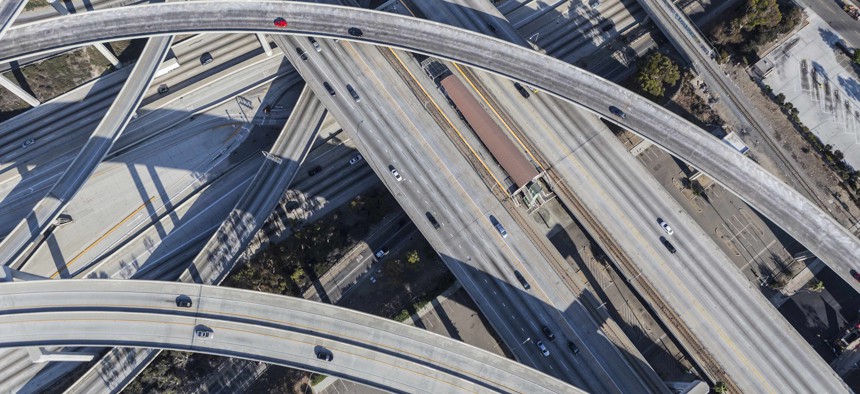Bipartisan, $304B Roads Bill Clears Senate Committee

A freeway interchange in Los Angeles, as seen in 2016. iStock.com/trekandshoot
Lawmakers in both parties are framing the legislation as a potential step toward a broader infrastructure deal. A new, $1 billion program for bike and pedestrian projects was added to the bill during a markup.
A Senate committee on Wednesday unanimously approved a measure to set federal funding levels and policy for road, bridge and highway programs over the next five fiscal years, authorizing $303.5 billion in spending.
The bill would increase funding levels by about 34% compared to the last five-year authorization and by around 22% compared to baseline spending projections from the Congressional Budget Office. Lawmakers from both parties have touted the level of spending in the bill as significant. But it is just a fraction of the much more expansive infrastructure investment package, in the $2 trillion range, that President Biden and many Democrats have been pushing for.
Still, both Democrats and Republicans have framed the bill as a step toward achieving a broader compromise on public works spending.
Sen. Shelley Moore Capito is the top Republican on the Environment and Public Works Committee and has served as the lead GOP negotiator on infrastructure talks with the Biden administration.
"There's been a lot of talk about a larger bipartisan agreement in conversation with the White House," the West Virginia senator said during a markup hearing for the highway legislation. "This bill, I think, really is the anchor to those bipartisan discussions."
Capito and other Republicans have rejected the size of Biden's proposal, even after the administration reduced it to around $1.7 trillion, from $2.3 trillion. GOP lawmakers have also rebuffed Biden's plan to raise taxes on corporations to pay for the plan.
The roads bill was amended during Wednesday's hearing, on an 11-9 vote, to include a new grant program for bicycle and pedestrian projects. The bipartisan sponsors of that amendment—Sens. Edward Markey of Massachusetts, a Democrat, and Dan Sullivan of Alaska, a Republican—scaled back their original proposal, dropping the funding level for the grant initiative to $200 million a year, from $500 million.
Trail and cycling advocates lobbied for this program. Capito opposed the amendment creating it, noting other funding for pedestrian, bike and trail programs is included elsewhere in the legislation.
"I see the amendment as duplicative and unnecessary," she said. "It's another billion dollars."
Sen. Tom Carper, of Delaware, who chairs of the Environment and Public Works panel, highlighted spending in the bill to reduce carbon emissions and upgrade transportation infrastructure to better withstand extreme weather and the effects of climate change. He said climate-related investments in the bill totaled about $18 billion, including $2.5 billion to build stations to charge and fuel electric or hydrogen-powered vehicles.
Carper also pointed to a program in the bill that would provide about $500 million for planning and construction grants to demolish or retrofit highways and other structures that carve through neighborhoods, creating physical or economic development barriers.
"It's a vital foundation for the president's American Jobs Plan," Carper said as he discussed the roads bill, using the name the administration has given to its infrastructure package.
Carper emphasized there is still plenty of work ahead for lawmakers to reauthorize the nation's surface transportation programs. The bill that the Environment and Public Works Committee approved only covers a portion of them. Transit and issues related to taxes and how to pay for the programs are handled by other committees. The House will also need to weigh in.
"This is not the end, but it's a good beginning," he said.
Capito said the bill would provide states flexibility and certainty by distributing 90% of total funding based on formulas. And she said she was particularly excited about a program that would provide $2 billion in grants over the five years to rural regions. She also noted provisions meant to speed up permitting and approval processes for projects.
"There is a lot in this bill for both sides and for all communities, no matter the size or region," she said.
Legislation Continues 'Broken System'
Transportation for America—a progressive group that advocates for prioritizing infrastructure maintenance over expansion, road safety over vehicle speed, and against road-building that supports sprawling development—sharply criticized the bill, saying that it "cements the broken status quo in place for decades."
"This bill attempts to solve the problems with the transportation system with small, underfunded new programs while spending way more to continue to churn out those same problems," the group's director, Beth Osborne, said in a statement.
“This bill is far from a down payment on the American Jobs Plan. In many ways it completely undermines it," she added.
The National Association of City Transportation Officials also knocked the legislation in recent days, saying that while it contains some promising new provisions and programs, it falls short addressing concerns related to safety, equity and curbing emissions.
"At a moment when we need robust investment in safety, local streets, and transit, the bill preserves vast amounts of funding for highway expansion," Corinne Kisner, the group's executive director and Janette Sadik-Khan, its chair, said in a statement.
They also said the legislation would continue a "broken system" that cuts cities out of decision-making processes that affect their streets and residents. "By continuing to funnel most federal transportation dollars through State [departments of transportation], with no required input from cities, publicly funded projects will have no obligation to reflect local priorities," they said.
The National Association of Counties applauded the bill's passage out of committee on Wednesday, with executive director Matthew Chase saying in a statement that it “provides renewed optimism for a timely, bipartisan surface transportation reauthorization."
"We welcome this positive step towards addressing our nation’s very pressing transportation challenges," Chase added.
Bill Lucia is a senior editor for Route Fifty and is based in Olympia, Washington.
NEXT STORY: State and Local Leaders Form New Group to Tackle Broadband Gaps






